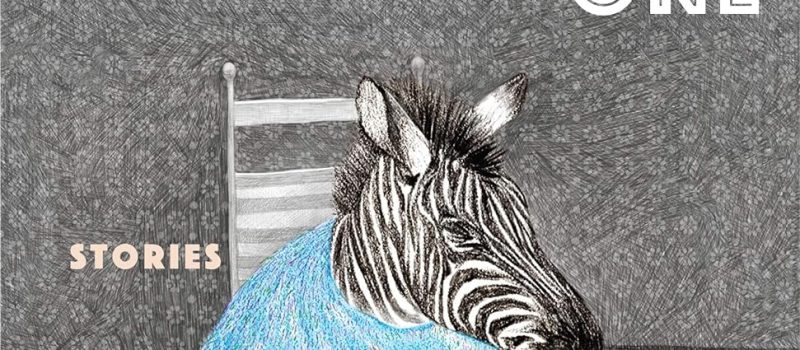Ian Mond Reviews Table for One by Yun Ko-Eun
 Table for One, Yun Ko-Eun (Columbia University Press 978-0-23119-202-6, $20.00, 280pp, hc) April 2024.
Table for One, Yun Ko-Eun (Columbia University Press 978-0-23119-202-6, $20.00, 280pp, hc) April 2024.
Yun Ko-eun (the pen name for Ko Eun-ju) will be unfamiliar to most English-language readers unless they’ve read her one translated novel, The Disaster Tourist. In South Korea, though, she’s the multiple award-winning author of several novels and short story collections and the host of the EBS Radio show Book Cafe. Thankfully, we now get to enjoy a little more of Yun Ko-eun’s work with the English language publication of her 2018 collection Table for One (translated by Lizzie Buehler) sporting a fetching cover of a zebra eating instant noodles (who, sadly, does not feature in any of the stories). With an emphasis on individual obsessions – whether it be a fixation on bedbugs, Iceland, body piercing, or dreams – these nine subtly surreal tales depict people at their most vulnerable and isolated, dislocated from those around them.
In the opening piece, which also happens to be the title story, our narrator, Inyeong, enrols in a course on how to eat alone. Inyeong hopes it will give her a ‘‘healthy stomach’’ (she suffers from nervous indigestion) and an ‘‘open-minded spirit’’ so she will be more appealing to her workmates. The course has a 15% pass rate, a fact Inyeong initially finds hard to believe. But as she becomes accustomed to the routine, disciplines, and rules of eating alone (different meals have a different beat), Inyeong realises that people deliberately fail the final test because they fear eating alone without having the support of the course and the structure it provides. It’s an oppressive story about exclusion and loneliness that pushes against the view across many cultures that eating is a familial or social activity. ‘‘Sweet Escape’’ is also stifling, but in a different and far creepier way. Here, the obsession is an intense fear of bedbugs that leads the recently unemployed protagonist to do everything in his power to defend his apartment. This all-consuming preoccupation with these near-invulnerable insects (not only did I learn more about bedbugs than I ever wanted to know, now they freak me out!) takes our protagonist on a strange, discomfiting journey where the things he fears become a comfort (he’s literally wrapped in the critters towards the story’s end).
One of the collection’s strengths is that while the stories might all return to a similar theme, there’s never a sense that Yun Ko-eun is repeating herself; instead, she’s exploring the idea from different angles. In ‘‘Invader Graphic’’, Gyun Kim’s fixation is the worldwide search for randomly placed ceramic tiles depicting a character from Space Invaders. The neat wrinkle is that Gyun Kim is a fictional character, the product of our narrator, a young woman who takes advantage of the complimentary amenities offered by a local department store to work on her novel. As the store starts to crack down on freeloaders, she becomes obsessed, searching out those few spots in the store that remain free. What begins as a comedic story grows increasingly melancholy and sad as the narrator and Gyun’s takes on a sense of hopelessness.
While every story in Table for One features an oddity or quirk, ‘‘Hyeonmong Park’s Hall of Dreams’’ and ‘‘Roadkill’’ are the most surreal and, as such, my favourite pieces in the collection. In the former, a ludicrously funny story with an operatic ending, the titular Hyeonmong, a failed businessman, discovers that the wealthy will commission him to dream, dreams they will then use to write a novel, navigate the stock market, or increase their penis size. Hyeonmong experiences the lavish highs of success and the horrible lows of failure as competitors eat into his market share. On the flip side, ‘‘Roadkill’’ is a horror story involving a hotel in a deserted part of Korea where each floor consists of hundreds of vending machines that flow ‘‘by slowly like conveyor-belt sushi.’’ Our hero is the owner of several of these machines, which disgorge party favours for those staying at the hotel. While re-filling the machines, a snowstorm traps our hero in the hotel. Thinking he won’t be there for long, he books one of the more expensive rooms, large and spacious. But with the storm unceasing in its fury and our hero’s money running short, he finds himself moving into smaller and smaller hotel rooms, where eventually even standing becomes impossible. Evocative of the ‘‘half floor’’ in Being John Malkovich, the character’s sense of alienation and loneliness is forced upon him by the vagaries of capitalism.
I was less enamoured with the next three pieces. ‘‘Time Capsule 1994’’ has a lovely premise: the early unearthing of a time capsule because of corrosion has the narrator, tasked with cataloguing the capsule, reflect on her past. However, I felt the weird element, the discovery of a CD that has no place being there, didn’t amount to much. ‘‘Iceland’’ has some funny moments – the narrator finds the country she’s most compatible with is Iceland – but seems to have many of the same thematic beats as ‘‘Table for One’’. ‘‘Piercing’’ is by far the grimmest tale, with the main character’s unhealthy interest in body piercing leading him to kill his girlfriend.
‘‘Don’t Cry, Hongdo’’, the collection’s final tale, doesn’t have the surrealism or oddness of the other stories, but as a commentary on those pieces, it’s magnificent. Told from Hongdo’s perspective, the teenager describes living with her mother – who supports an organic lifestyle – and her school, where she hates how she has to keep changing her art to suit the school’s standards. The tragedy of this story is that with the suppression of her sense of self and uniqueness, we know what waits for Hongdo. She will become another adult seeking to fill the void in their life by fixating on a single thing, treating it as a proxy for their identity. It’s the cautionary, ominous end to a strong collection.
Ian Mond loves to talk about books. For eight years he co-hosted a book podcast, The Writer and the Critic, with Kirstyn McDermott. Recently he has revived his blog, The Hysterical Hamster, and is again posting mostly vulgar reviews on an eclectic range of literary and genre novels. You can also follow Ian on Twitter (@Mondyboy) or contact him at mondyboy74@gmail.com.
This review and more like it in the April 2024 issue of Locus.
 While you are here, please take a moment to support Locus with a one-time or recurring donation. We rely on reader donations to keep the magazine and site going, and would like to keep the site paywall free, but WE NEED YOUR FINANCIAL SUPPORT to continue quality coverage of the science fiction and fantasy field.
While you are here, please take a moment to support Locus with a one-time or recurring donation. We rely on reader donations to keep the magazine and site going, and would like to keep the site paywall free, but WE NEED YOUR FINANCIAL SUPPORT to continue quality coverage of the science fiction and fantasy field.
©Locus Magazine. Copyrighted material may not be republished without permission of LSFF.








